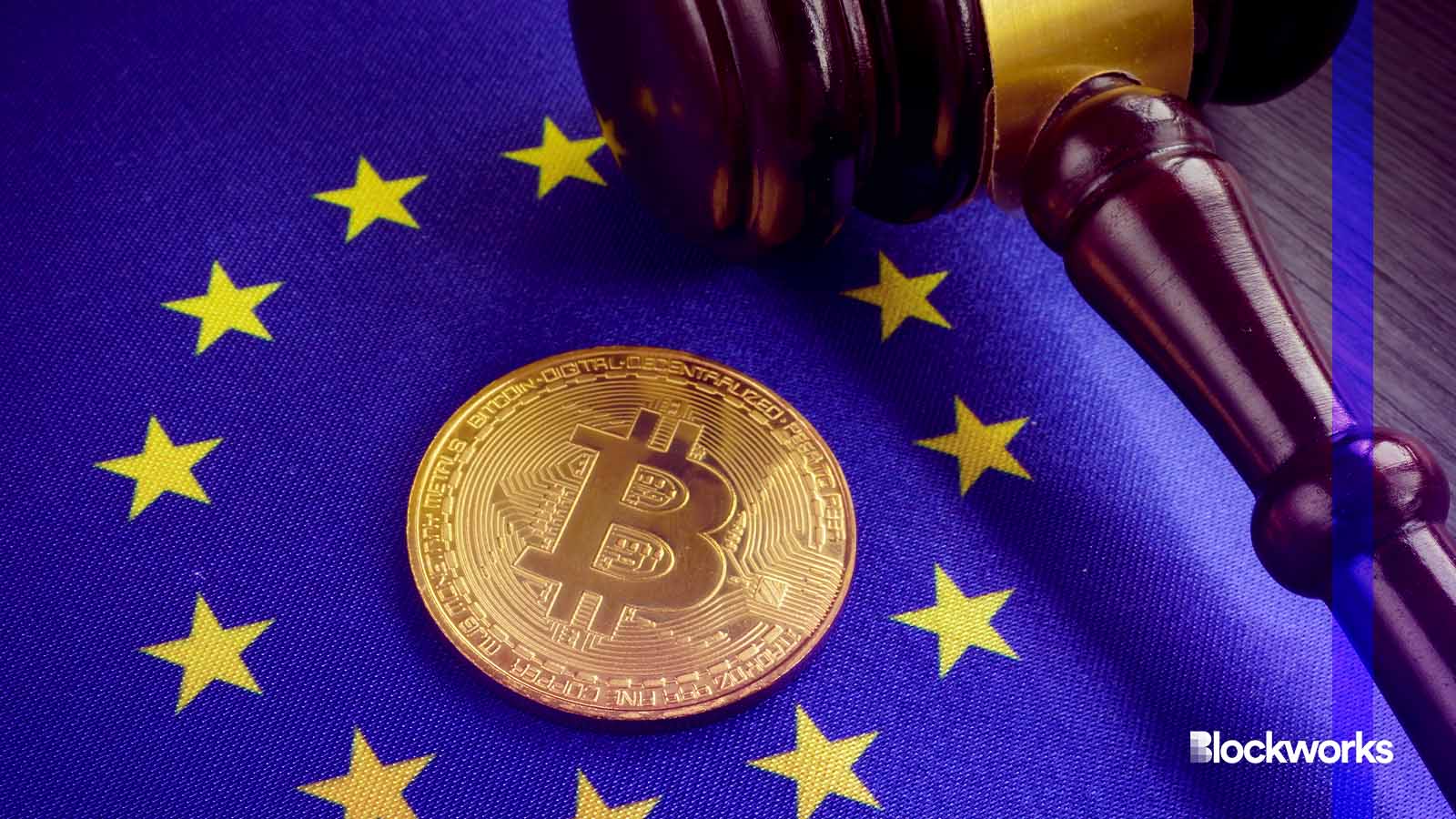EU’s MiCA regulation defers decisions on DeFi
The initial scope of MiCA is focused on stablecoins and centralized exchanges

Vitalii Vodolazskyi/Shutterstock modified by Blockworks
Decentralized finance (DeFi protocols) are interpreted to be exempt from the scope of the European Union’s Markets in Crypto-Assets Regulation (MiCA), according to consultancy BCAS. But only when it is “fully decentralized” — meaning no person or company controls the platform being used.
The European Commission will be mandated under MiCA to develop a detailed report assessing the pros and cons of DeFi over the next year or so, Mark Foster, the EU policy lead at the Crypto Council for Innovation told Blockworks.
This will help determine what the next steps for DeFi will be in the EU.
“If there are risks that have been identified, they can propose legislation at a later stage for the EU to then potentially develop something on DeFi in the course of the next Parliament,” Foster said.
For now, though, there is very little direct impact on any DeFi protocols in the region.
“This was a conscious political decision by EU policymakers when negotiating MiCA given the small size of the nascent market and a desire to see the market evolve and become more understood before deciding on how it should be regulated,” he said.
Read more: Why crypto companies are flocking to Ireland ahead of MiCA
MiCA’s original intention was to create comprehensive provisions and rules around stablecoins and centralized exchanges, a conduit point between cryptocurrency and fiat currencies, Foster explained.
“They were the things they felt needed to be prioritized, so when it came to other areas of the ecosystem, in particular DeFi as a broad concept and NFTs, there was a conscious choice by the legislator to say, ‘Let’s not do this now,’” he said.
Foster notes that DeFi today is still very small compared to the size of the traditional financial sector at large, which handles values in the trillions of dollars.
According to data aggregator DeFiLlama, the total value locked (TVL) on DeFi protocols sits at $77 billion.
The EU’s careful approach to MiCA has significant benefits, says Kevin de Patoul, co-founder and CEO of digital asset market maker Keyrock.
“I believe it is better to have potential gaps in the framework that can be addressed as the understanding of the implications deepen, rather than over-regulate too early and just kill innovation,” de Patoul told Blockworks.
Though that is the case, there are risks that come with excluding DeFi from MiCA, de Patoul notes. Risks include gaps in oversight, risking consumer protection and risk management, just to name a few.
“To mitigate these risks, it becomes imperative for digital asset services and product providers to proactively maintain high standards and transparent practices,” he said. “Self-regulation based on best practice will be crucial in safeguarding the interests of consumers and maintaining the integrity of the digital asset industry.”
In contrast to the EU, there is a clear lack of clarity in the US when it comes to engaging with DeFi protocols.
Read more: DeFi is facing a ‘full frontal assault’ from regulators
Christina Fraziero, an associate at CMS Legal, told Blockworks that the EU’s initiative to address the regulatory landscape of crypto assets and blockchain technology puts it at a competitive advantage over the US. She noted that MiCA reflects the EU’s avant-garde and evolving approach to regulation.
“It is a comprehensive regulatory framework for crypto assets that offers a stark contrast to the dismal regulation by enforcement approach taken by US regulators against the sector, demonstrating to industry participants across the globe that thoughtful, clear regulation that balances consumer protection with innovation is possible,” she said.
Fraziero notes that Web3 software developers in the United States have been focused on distributing profits away from centralized control and to unaffiliated community members.
This is largely due to a speech given by the US Securities and Exchange Commission’s William Hinman, who shared that digital assets are not considered a security offering if the network of the digital asset is “sufficiently decentralized.”
According to Foster, following the development of the detailed report by the European Commission in the DeFi space, lawmakers will have an opening to draft new legislation.
“It could be a very long process between the adoption of a report to becoming a draft legislation, but at the very moment, DeFi is out of MiCA scope,” Foster said.
For the time being, Foster notes that MiCA provides the necessary legal clarity regarding the broader framework in the EU for centralized exchanges and stablecoins, even if there are still detailed technical provisions that must be resolved.
Read more: eToro receives Cyprus registration ahead of MiCa rollout
“Having such legal certainty enables industry to plan and invest, which helps build the ecosystem without fear of being sued,” he said.
Get the news in your inbox. Explore Blockworks newsletters:
- The Breakdown: Decoding crypto and the markets. Daily.
- 0xResearch: Alpha in your inbox. Think like an analyst.






